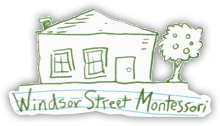What are the attributes that a Montessori education encourages?
- a lifelong curiosity and love of learning
- respect for one’s self and others
- sense of responsibility and accountability for one’s actions
- confidence
- independence
- intrinsical motivation
- critical and creative thinking
- problem solving
- social responsibility
- compassion
- peacemaking
- academic readiness
- able to handle external authority
- protection of the environment and its resources
- an attitude of celebration of diversity

How does Montessori education promote a more peaceful world?
International and multi-cultural studies are emphasized starting at the primary level with the introduction of geography and peaceful conflict resolution.
The focus is on the whole child: social, emotional, physical, spiritual, and academic learning.
Respect for all living things and people, the community, and the environment is practiced every day.

How does the multi-age classroom effect the learning process?
Multi-age learning is an integral part of the Montessori philosophy at all levels. All individuals learn from each other and have opportunities to lead, share, and model for their peers. Students can accelerate or take additional time as needed to learn skills. AMS teacher education programs prepare teachers to work with a 3-year age span and to have the expertise to support skills both above and below a developmental level.

How is student’s progress assessed?
The Montessori philosophy is process-oriented and individualized. As such, assessment is multi-faceted. Information about a student’s progress is collected systematically through daily work, journals, portfolios, observation, and anecdotal records. Parents and students, as well as teachers, contribute information to the assessment.
What is the teacher’s role in the Montessori classroom?
The teacher designs and prepares an environment that offers developmentally appropriate choices and challenges in all areas of the classroom. He/she facilitates the child’s interaction with that environment, stepping back to allow the child to be as independent and self-directed as possible. The teacher also ensures that the classroom is safe and caring for all, where children are able to try new things and build self confidence.

What professional organizations is WSMS affiliated with?
North American Montessori Teachers Association (NAMTA)
International Montessori Council (IMC)

What is unique about WSMS?
Most obvious is the Montessori philosophy, curriculum, materials, and teacher education, together these ensure an atmosphere of respect, and foster self-directed learning in a mixed age group that includes individualization as well as small and large group activities.
The amazing atmosphere in the school also derives from the happiness that students exhibit when they are challenged to learn and find it fun, the self-esteem they display when they treat others the way they wish to be treated, and the joy they feel at being a respected member of a group of children like them, each with his/her own special gifts.

Will Montessori prepare a child for the “real world”?
(Question answered by Maura Joyce, the Head of School from Montessori in the Redlands in California)
“Well, let‘s define the REAL world… At your job, is everyone the exact same age? Is everyone sitting at their desks, doing the same thing at the same time? Are they doing tasks that require them to access knowledge, off the top of their heads, in a timed setting? OR… Do you have different people with different levels of experience working in your office? Do you collaborate with your colleagues on projects? Do you need the right tools for the right jobs? Do you need to be able to set up work, concentrate on it, keep it organized, put it away? Do you have to be able to work independently, and work in a group? Do you need to try things and discover that they work or don‘t work, this is, learn from your mistakes? Do you need to be able to problem solve? Communicate effectively?” Montessori IS the REAL world.
